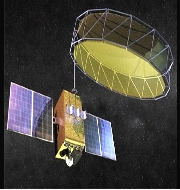ISRO, NASA working towards realisation of NISAR Mission by 2021
ISRO and NASA are jointly working on the NASA-ISRO Synthetic Aperture Radar (NISAR) mission to co-develop and launch a dual frequency synthetic aperture radar (SAR) satellite by 2021.
The satellite will be the world’s most expensive earth-imaging satellite till date, costing around $1.5 billion. It aims to study global environmental change and natural disasters.
Salient Features
- NISAR is a dual frequency (L & S Band) Radar Imaging Satellite. It will be the first radar imaging satellite to use dual frequency.
- In this joint mission, NASA’s Jet Propulsion Laboratory (JLP) will be responsible for design and development of L-band SAR, GPS system, 12m unfurlable antenna and data recorder.
- ISRO will be responsible for design and development of S-band SAR, Spacecraft Bus,data transmission system, spacecraft integration & testing, launch using GSLV and on-orbit operations.
- Mission Life: It is expected to be launched in year 2021. It will have mission life of 3 years.
- Operational orbit: The satellite is planned to be launched into a Sun-synchronous dawn to dusk orbit.
- Applications: It will provide an unprecedented detailed view of Earth by taking snapshots every week using advanced radar imaging.
- It is designed to observe and take measurements of some of the planet’s most complex processes, including ecosystem disturbances, natural hazards such as earthquakes, tsunamis, volcanoes and landslides.
- It will be used also for natural resources mapping & monitoring, estimating agricultural biomass over full duration of crop cycle.
- It will be also monitor floods and oil slicks, coastal erosion, coastline changes and variation of winds in coastal waters, surface deformation studies due to seismic activities etc.
- Implementation Process: Implementation Arrangement (IA) of mission, defining roles and responsibilities of ISRO and NASA was signed between two space agencies in September 2014.
- So far, ISRO has completed Baseline Design Reviews of satellite and S-band SAR payload. NASA’s JLP has successfully completed Mission Concept and Key Decision Point reviews. The first Joint Steering Group (JSG) meeting of NISAR was held in July 2015.
- Cost of the project: Costing around $1.5 billion, it will be world’s most expensive earth-imaging satellite till date.
- Space Diplomacy: The mission will establish a general pathway for future joint missions between ISRO and NASA for Mars exploration. It will also further strengthen the Indo-US ties.
Month: Current Affairs - August, 2017


